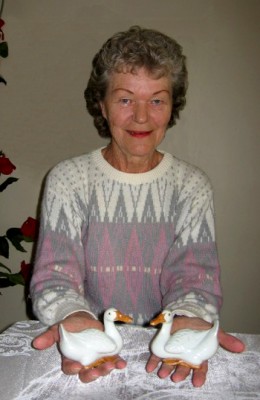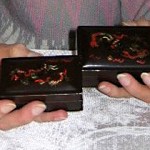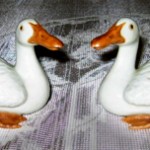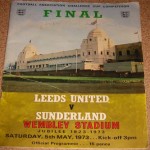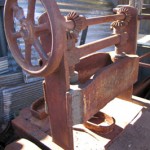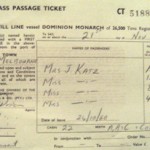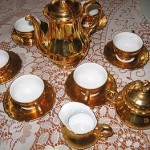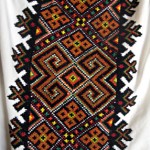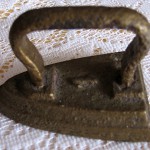Russian
Shanghai, China
Tubabao, Philippines on 31 October 1949
Sydney on 9 November 1949
Bathurst for two months then Parkes for one year
We shared a home with a family in La Perouse, SE Sydney.
Picking peas at Bathurst in central-west NSW.
Cherry picking in Orange (central-west NSW); domestic helper for a family in Killara (N Sydney); bartending, cleaning and factory and secretarial work across Sydney.
I was born in Shanghai, China on 12 June 1936. My mother was from Kiev, Ukraine and my father came from Siberia in Russia. Many Russians fleeing Communism found themselves in Harbin, China as it was close to the border and on the Trans-Siberian Railway. My parents arrived in Shanghai in 1935. Although they lived in China, they had very Russian souls and we were brought up in the Russian Orthodox tradition.
We lived in the Jewish section of Shanghai, in the bottom part of a house. When I was about five years old, we moved to the French section, where my father worked as a watchman in a French bank. We lived on the premises in what was called a gadoun, where they stored coal for the bank’s central heating. I loved to have a bath as a child, so much so that I hated to get out once I was in. A family friend used to call me ‘Duckling’ because of this and the name stuck. He gave me two china ducklings on my 12th birthday, which are the only things that have survived from my life in Shanghai and remind me of my childhood.
In our gadoun we had a three-quarter bed for Mum and Dad and a tiny bed for my sister. I slept on the chairs, which were pushed together. We had electricity but we cooked by primus. We also had a hibachi 1 which my father made from a kerosene tin. We lived very poorly and sometimes had no heating at all.
When I was a baby, every month the Salvation Army would give Mum a tin of Carnation milk just for me. Mum used to put a couple of drops of milk in hot water, add a piece of bread, put it in a piece of gauze like a dummy and stick it into my mouth. It must have been very difficult for her.
Then came World War Two and we were in the midst of it. The Japanese invaded Shanghai and we hid in bunkers when we heard the sirens. After the raids were over there would be trucks carrying wounded and dead people. We were very frightened.
After the war, life was very good. Then the Communists were closing in. My father was a former military man and was concerned for the safety of the family. We desperately needed to get out but no-one wanted us. The British, Americans and French refused to take refugees. In 1949 we were told that we could go to an uninhabited island in the Philippines called Tubabao, which had formerly been used by the American military close to the end of the war. It had been arranged by the International Refugee Organisation.
The organisation found three ships that were almost ready for scrap, but they had no crew. Finally, Chinese prisoners, some of them murderers, were allowed to leave jail to man the ships and, as a reward, they could obtain their freedom when they returned. They took the chance knowing that the ships could sink anytime. As we were leaving China, I bought two little camphor boxes covered with lacquer from the Chinese people who were selling goods on the wharf. I had some Chinese money left and my father told me I should spend it because of the uncertainty of whether we would return to China. I let the money down in a tin and the boxes were hoisted up to me on the ship. They are not valuable but have sentimental value as they are a memory of our actual departure from China.
We left for the Philippines in early February 1949. It took us about two weeks as our ship, the Hwa Lien, kept breaking down. Among Russian refugees, we had doctors, nurses, engineers, mechanics, everything onboard. By the time we got to Tubabao, the ship was [leaning on one side] and we were all asked to move to the opposite side to prevent it from toppling over. In all, 5,000 Russian refugees escaped to Tubabao.
We had left Shanghai in winter but it was very hot in Tubabao. The men used large cane knives to cut down the thick undergrowth, while the women and children trampled it down to erect tents. For the children, it was an adventure; we learnt to swim and dive and we had such things as scouts and lifesavers.
The American military authorities supplied us with tinned meat, macaroni and dried vegetables which were left over from the war. We also found many tins of food, but had to be careful as some of them were contaminated. When one is so hungry one does not think too much about the dangers. The macaroni was infested with weevils and we had to pick them out before it was cooked in communal kitchens.
Our most serious problem proved to be the lack of fresh water. The men had to get it from a little spring and carried it back to camp in metal containers. Water was rationed, about three cups per person, per day.
Everyone had to help out in the kitchen or at other tasks. The Filipinos soon became business minded and knowing that there were 5,000 Russians on the island, they set up a hairdressing salon and an ice cream parlour. Mum used to wash clothes for people to be able to give me and my sister a treat such as a bottle of Coca Cola, an ice cream, lollies and a few cigarettes for herself.
After nine months on the island we migrated to Australia. My mother had contracted tuberculosis (TB) and if it was known then we would not have been accepted to [come to] Australia. Compulsory X-rays here in Australia revealed that she had TB. She was hospitalised in Turramurra in Sydney and the TB recurred later.
Argentina opted to take 100 of us. Uruguay took 200 and other countries took smaller numbers. Most people wanted to go to America but the waiting list was very long. Australia was my father’s choice. He knew if we waited for America we would have been there two or three years. The Australian delegates started to interview families wishing to go to Australia. We children wanted to go to America. Father said, “We are going to Australia and that’s the end of it.”
The medical examination to get to Australia was dreadful. We had to strip naked and you had to have no scars. I was 13 and it was most embarrassing for me. I had a small scar on my finger, which caused some worry, but finally we were accepted.
We left Tubabao on 31 October 1949 onboard the American warship General Greeley, arriving in Woolloomooloo in Sydney on 9 November. The men had to sleep in hammocks down below, but the women and children had cabins. We were in a cabin for six, with another woman and her two children. We spent most of the voyage on deck which was great.
On arrival we were put onto trains and taken away. God knows where. We didn’t know where we were going. We were all night on the train and the only thing we could see in the morning [was] the mist and the bush. Where in the world were we taken? We travelled all night. We were starving, hungry. We ended up in Bathurst in central-west NSW.
Sometime in the morning we were put onto buses and taken to the camp. The children were given a glass of hot milk. I was dying to have a taste but it was so hot that I had to wait for it to cool down before I could enjoy it. Later we were greeted with a hearty breakfast.
We lived in a Nissen hut where the four of us were together again. Soon afterwards my father was taken to Port Kembla in the Illawarra, as he had signed a two year contract to work where the government sent him. He worked in a chemical fertiliser plant. My sister also had to sign a two year contract which made my father most unhappy. She was sent to work in Lindfield on Sydney’s upper north shore, doing the laundry for hospitals. She married at age 16 just to get away from it. Sadly, it did not turn out to be a good marriage.
Mum and I were sent to a camp at Parkes [also in central-west NSW], where we lived in barracks. It was the first time that we had ever been separated from my father and sister. We did not like it at all.
My first job in Australia was at Bathurst, where I picked peas for a farmer. After that I went cherry picking in Orange, before becoming a domestic helper in Killara [near Lindfield]. I had to look after two girls, aged 10 and 11, which was difficult as I was only 14 myself. I quickly learnt how to prepare vegetables and do other menial duties. For all that, I received two pounds a week. My father hated the idea of his daughter doing such work. He wanted me to be well-educated.
By the time I was 15 we were all living under the same roof again in the Sydney suburb of Mascot. Mum and I worked in a factory in Botany Road called Caesar Fabrics as invisible menders, where they produced good quality fabrics. My father had left Port Kembla and was working at Ralph Simons Furniture Company.
I married a German man named Heinz when I was only 17. We had been living in rooms in Newtown and he lived in the same place. We married in 1953. The ceremony was at a Russian church in Robertson Road, Moore Park. It was not a happy marriage.
Our daughter was born in 1955. We were all living in one house: Heinz and I and our baby; my sister and her two children; my mother and father; and an elderly woman who had come out from China. When our daughter was about 18 months old, I was very down money-wise. I had three jobs. I used to get up at four o’clock in the morning and go to the city at Circular Quay. There was a bank and I used to clean the offices there and prepare morning tea. Then I would go to St Peters and work in a factory where they made steel wool, Steelo. Then I would rush home, play with my daughter a little bit and have a shower or whatever, then go and work in the bar.
I worked at Duke of Edinburgh Hotel at Enmore and then Enmore Hotel until ten o’clock at night, then Wynyard Hotel in the city. You had to find work where it was paid well. Luckily, I used to get a lot of tips. That’s why I went to work in pubs because I got more tips than wages.
Heinz and I parted a year later and my father died of cancer. While he was dying, he begged me to take Heinz back and I could not refuse a dying man, so we were together again. I had hoped that having another baby might bring us closer.
Our son was born in 1963 and we built this house in [south-west Sydney] in 1966. In those days a woman couldn’t buy property. You had to be married. Having a house of your own, it was everybody’s dream. [Heinz and I] are no longer together but we are friends.
I retired at 55. I was working in an office, doing a secretarial job for Pasta Foods at Guildford for six years. My parents always wanted me to work in the office but I didn’t have confidence in myself because I wasn’t well-educated. My education had stopped at the age of 12; I am self-taught. I believed that only educated people work in an office. But eventually I did.
I now belong to a Russian group run by the Multicultural Respite Network. We meet weekly in Cabramatta and play bingo, do gentle exercises and go on bus trips. I have never been to Russia nor have I ever returned to China. This is God’s own country and I would never live anywhere else.


